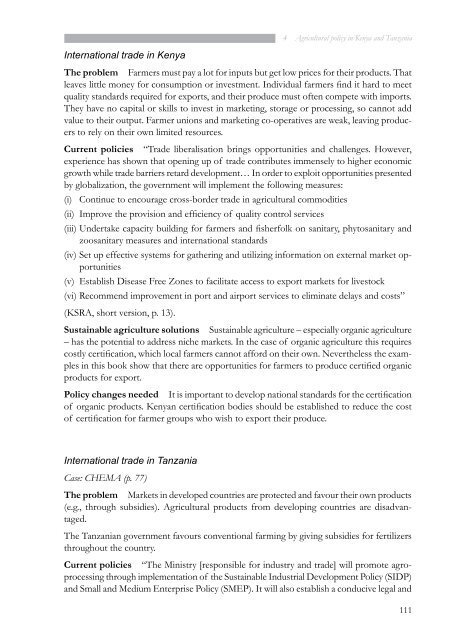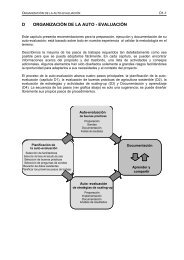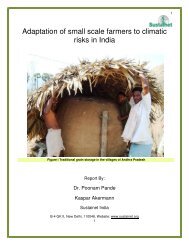cases from tanzania - Sustainet
cases from tanzania - Sustainet
cases from tanzania - Sustainet
Create successful ePaper yourself
Turn your PDF publications into a flip-book with our unique Google optimized e-Paper software.
4 Agricultural policy in Kenya and Tanzania<br />
International trade in Kenya<br />
The problem Farmers must pay a lot for inputs but get low prices for their products. That<br />
leaves little money for consumption or investment. Individual farmers find it hard to meet<br />
quality standards required for exports, and their produce must often compete with imports.<br />
They have no capital or skills to invest in marketing, storage or processing, so cannot add<br />
value to their output. Farmer unions and marketing co-operatives are weak, leaving producers<br />
to rely on their own limited resources.<br />
Current policies “Trade liberalisation brings opportunities and challenges. However,<br />
experience has shown that opening up of trade contributes immensely to higher economic<br />
growth while trade barriers retard development… In order to exploit opportunities presented<br />
by globalization, the government will implement the following measures:<br />
(i) Continue to encourage cross-border trade in agricultural commodities<br />
(ii) Improve the provision and efficiency of quality control services<br />
(iii) Undertake capacity building for farmers and fisherfolk on sanitary, phytosanitary and<br />
zoosanitary measures and international standards<br />
(iv) Set up effective systems for gathering and utilizing information on external market opportunities<br />
(v) Establish Disease Free Zones to facilitate access to export markets for livestock<br />
(vi) Recommend improvement in port and airport services to eliminate delays and costs”<br />
(KSRA, short version, p. 13).<br />
Sustainable agriculture solutions Sustainable agriculture – especially organic agriculture<br />
– has the potential to address niche markets. In the case of organic agriculture this requires<br />
costly certification, which local farmers cannot afford on their own. Nevertheless the examples<br />
in this book show that there are opportunities for farmers to produce certified organic<br />
products for export.<br />
Policy changes needed It is important to develop national standards for the certification<br />
of organic products. Kenyan certification bodies should be established to reduce the cost<br />
of certification for farmer groups who wish to export their produce.<br />
International trade in Tanzania<br />
Case: CHEMA (p. 77)<br />
The problem Markets in developed countries are protected and favour their own products<br />
(e.g., through subsidies). Agricultural products <strong>from</strong> developing countries are disadvantaged.<br />
The Tanzanian government favours conventional farming by giving subsidies for fertilizers<br />
throughout the country.<br />
Current policies “The Ministry [responsible for industry and trade] will promote agroprocessing<br />
through implementation of the Sustainable Industrial Development Policy (SIDP)<br />
and Small and Medium Enterprise Policy (SMEP). It will also establish a conducive legal and<br />
111




